In this article, a detailed look at all the signs and symptoms of degenerative disc disease of the cervical spine. Osteochondrosis is a degenerative destruction of the vertebral discs and the vertebrae themselves with degenerative manifestations.
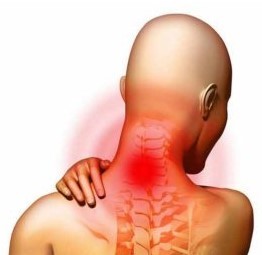
However, due to the violation of the integrity of the intervertebral component, appear more terrible pathology, a hernia and protrusion, up to bone destruction.
What is osteochondrosis
You need to remember that the process of destruction of the vertebrae and discs is irreversible and to restore the original performance will not work. All you can do is slow the process of destruction.
Cervical osteochondrosis is far more dangerous, as that the spine is a tremendous number of nerve fibers and blood vessels, functioning directly with the brain and body in General. The vertebrae in the cervical region are very close to each other, which also creates the danger.
Any squeezing of the nerve endings, arteries, blood vessels, disrupts the blood supply and nutrition of the entire organism, which leads to a number of symptoms.
Symptoms
Cervical osteochondrosis can not be disassembled, due to the similarity with other pathologies. And at the initial stage, you can even take it for normal fatigue or overexertion. And often the diagnoses are false. When diagnostics are important to determine which nerve branches compressed, perhaps because the brain suffers from lack of circulation.
Common manifestations of cervical degenerative disc disease are:
- Headache. This is the first and persistent symptom. With the development of the disease, pain is worse. The pain is similar to migraine, but docked painkillers. Of course, if you run the disease, the painkillers no longer work. Basically, the person experiences a pulsation in the temporal and occipital region. Found and parietal locations.
- Weakness in the arms. It is considered a sign of damage to the nerve process, which is responsible for the regulation of innervation of the upper limbs. The damage may be very strong, up to paralysis.
- Poor mobility, crunch. With cervical osteochondrosis often turn head hard. Also, head movements are limited to forward and backward. And in this case accompanied by a crunch of joints.
- Numbness in the hands or other parts of the body. Hands or fingers may lose sensitivity. If you do not treat low back pain, numbness increases until complete or partial paralysis of the body. Depends on the area of lesion of what nerve endings is damaged.
- The deterioration of hearing and vision. Sometimes there is a feeling of numbness of the tongue and lips, flashing "flies" before the eyes, blurring of objects. Lose affects these organs because of the proximity to each other and lack of oxygen in the brain.
- The lack of air. Appears in lesions of the cervical often due to irritation of the phrenic nerve. The patient is unable to breathe, experiencing shortness of breath and dyspnea, snoring appears. The result is hypoxia, constant fatigue, loss of memory, attention, weakness and malaise.
- Dizziness. Very unpleasant symptom that violate the coordination of movements. Accompanied sometimes by nausea, fainting, tinnitus. Feel the vibrations of the floor under his feet. Appears when oxygen starvation of the brain due to dysfunction of blood vessels and arteries.
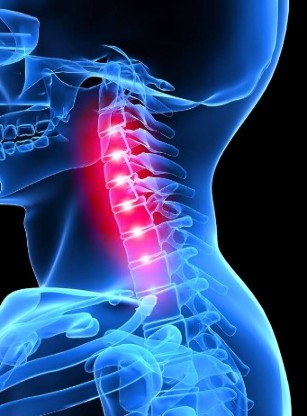
Reasons
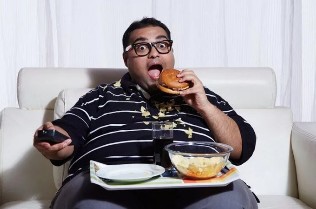
A lot of them. Still did not appear a clear opinion why low back pain affects a particular area of the spine. But, factors have long been known.
Lifestyle
The most common cause of cervical degenerative disc disease. Because the modern man doesn't move. The model of society and social behavior change, progress does not stand still and low back pain more and more "younger".
In this group include:
- sedentary lifestyle — lack of exercise;
- poor diet and excess weight;
- continuous tense, or uncomfortable (common among drivers and office workers);
- the lack of stress on the spine, which weakens the muscular corset;
- on the contrary, too much load on the spine.
Injury
In injuries of the spine, in 90% of cases suffering from cervical. Often violations are discovered, but sometimes for the development of the disease takes time.
Disruption in the hormonal
For this reason, can be affected not only people in middle age, but teenagers, during the restructuring of the whole organism. It is worth noting that in this case, the disease is preventable and treatable.
If to speak about menopause in women and hormonal diseases, diabetes mellitus and multiple sclerosis, the treatment is symptomatic.
Genetic predisposition
This factor is more related, because genetics is not the basis for the development of the disease. But it affects the appearance of other reasons.
Diseases of the musculoskeletal system
This – scoliosis, bad posture.
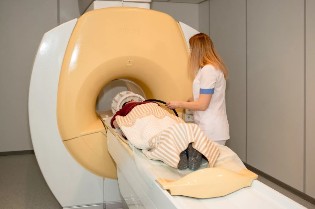
Diagnosis of the disease
Diagnosis can be established only by a doctor. When the first symptoms of osteoarthritis, be sure to consult with a specialist. Diagnosis is carried out by several methods.
For example, apply to:
- CT (computed tomography);
- MRI (magnetic resonance imaging);
- dopplerographic study of the blood vessels;
- x-ray is a commonly used method of detecting the disease.
Each method is effective at a certain stage of development of osteochondrosis. For example, radiography will not be informative at early stages of pathology.
In severe disease accompanied by disturbance of sensation, paralysis and fainting, held Doppler.
From the time of diagnosis influenced the success of treatment. What he used, the more likely the minimum disruption of the spine.
The stage of the disease
To distinguish between 4 stages of development of osteochondrosis.
- The presence of pain in the neck, the neck area on palpation. Thus react to the affected nerve branches. The pain is worse when moving the head, often when cornering. While at this stage the spine is intact, the affected intervertebral space.
- Characterized by pain shooting character, which gives to the hand, shoulder or arising from the movement of the head. Pain similar to a migraine. Develops insomnia. At this stage of the disease the vertebral disks begin to change destructive.
- The pain becomes constant, amplifying. Numbness and stiffness of the limbs, head movements difficult. In the hands of the increasingly felt weakness. Suffers from attention and memory. The intervertebral discs have been broken, they develop cracks, and joint capsule bulges. The formation of a herniated disc.
- Complete destruction of not only disks but also of the vertebrae. The bone was also destroyed. At this stage, surgical intervention is necessary, because the resulting hernias are the result of a paralysis not only of the hands but the entire body.
It is believed that low back pain can be treated at home only on the first two stages. The third requires a more professional observation and treatment under the supervision of a neurologist or vertebrologist.
Treatment at home
Is it worth mentioning that the treatment even at the first stage without consulting a doctor is not carried out. Still, for the diagnosis of cervical degenerative disc disease in addition to advice necessary to make a diagnosis and examinations. Because low back pain can masquerade as more serious pathology associated with heart failure.
If the diagnosis is wrong, then the treatment will be assigned late. The consequences can be terrible – cerebral ischemia, stroke, spinal nerve compression, and other diseases that threaten the patient's life.
At home treatment consists of:
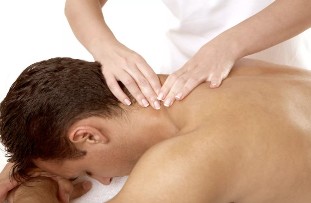
- drug therapy;
- massage;
- of medical gymnastics.
It is important to approach treatment in a holistic manner. Otherwise the result may not be or will be but temporary.
Medication
The appointment and use of drugs necessary for the relief of severe pain, the mobilization of the disease, relieving symptoms.
Drugs can be administered different directions:
- reducing blood pressure and improving brain function – the so-called neuro-protectors. They are large group of medical drugs;
- improve vision;
- prevents numbness, or relieve muscle spasm – muscle relaxants;
- anti-inflammatory –;
- non-steroidal anti-inflammatory – reduce inflammation about the pain in the acute phase. They are available not only in tablets but also in capsules, ointments and solutions for injections. Not intended for prolonged use due to the hard impact on the mucosa of the gastrointestinal tract;
- b vitamins (B1, B6, B12). Help to restore the health of the brain and nervous system. Responsible for the transmission of nerve impulses.
Vitamins can be taken in pill form or injections under the scheme. The second option allows you to achieve better effect;
Chondroprotectors occupy a special place. Are drugs invented to improved nutrition of the intervertebral cartilage, which slows their dystrophic and degenerative changes. Effective only on the first two stages.
Massage
It is an integral part of treatment. Traditional massage on the advice of experts should be held courses every six months. Today, there are a lot of methods of treatment of osteochondrosis of the cervical area and there are plenty to choose from.
For example, the practice of manual techniques that are proven in a positive way and gives good result in treatment.
Recently introduced in the direction of osteopathy, is very interesting, because considering the human body as a single unit with the musculoskeletal system, mental and nervous. They are all one. The treatment is carried out by hand.
Acupuncture too is a good solution under the condition of holding it by an experienced technician.
Hirudotherapy or leech therapy on efficiency is on a par with acupuncture.
Gymnastics
We already talked about the fact that one of the factors, influencing the development of cervical degenerative disc disease is low physical activity of the back muscles. In our days we most of the time we spend in a seated position without changing your posture, which can be quite uncomfortable.
Important information! You cannot perform exercises during acute pain.
To maintain and strengthen the muscular system need daily to follow the ten simple exercises. They are particularly relevant at the initial manifestations of the disease.
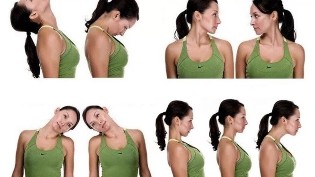
- Starting position – standing, naked, shoulder-width apart, stomach in, and shoulders back. From this position the hands need to be lifted sideways and upwards, joining at the top with subsequent abstraction ago. Feel how the blades are connected. After that, the position of the body aligned. Repeat up to 7 times.
- Yip the same thing. Okay, hang on as hard as you can to the elbows looking forward. Then put your arms back so that her hands touched the elbows. Don't forget to involve the stomach constantly. Repeat up to 10 times.
- Better this exercise to perform while standing, but if it is difficult or dizziness, then it's acceptable sitting position. Keep the neck straight, and shoulders straighten. The head should turn to the left and chin to get to the shoulder without lifting it. The same in the other direction. The exercise is done alternately with snooze up to 5 times.
- Similar to exercise # 3, only the head does tilt forward and back at a very slow pace.
- Slowly and carefully take the semicircle is tilted forward with his head, from left shoulder to right and back. Attention! It is impossible to make a circular motion, only a semicircle!
- IP – standing. You should make your hands into fists and propping up his chin. Press the chin on your hands for 5 seconds, then, change the position on the occipital region. Very effective exercise for training the muscles of the neck. Repeat 4 times.
- Seated hands rest on her hips, and the head is tilted more forward. Ideal is the situation when the chin rests on the chest. In this perspective, rotate your head left then to the right. It is important that the chin all the time touches your chest. Repeat up to 10 times.
- Need a chair with a low back. It will be good if this exercise is performed at least 4 times. Shoulders straightened. The task is to try to look at the wall behind him.
- Sitting on the chair. Hands between his knees. Inhale – tilt to the side. Exhale – straight position. Running alternately left and right to 7 times.
- Exercise on the belly. Lying down need to bend up, trying to fix the body as high as possible and longer. Repeat 6 times.
The complex is only done at a convenient time and gradually increase the number of repetitions.
Folk remedies
Treatment of folk remedies is more activities aimed at warming the patient zone. But here you need to be wary of such practices, as the neck is in great proximity to the brain. And so, instead of heal, can harm.
In the treatment of folk recipes, it is better to choose with a softer impact, avoiding serious irritation.
Recipes:
- Ointment from my grandmother. Does iodine and camphor 10 ml, analgin – 10 tablets, crushed, alcohol – 300 ml All mixed and neck smeared with a thin layer overnight.
- Potato poultice of grated potatoes and honey. Superimposed on the night.
- A poultice of horseradish. Fresh leaves of horseradish are processed over the steam and superimposed on the neck as a compress for 15 minutes.
- A compress of aloe. Taken 1 part of aloe leaves and milled, is added to 2 parts honey and 3 parts of alcohol of the product. The mixture should stand for 12 hours. Compress is applied for 15 minutes maximum.































